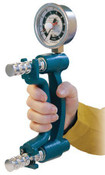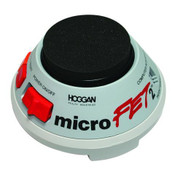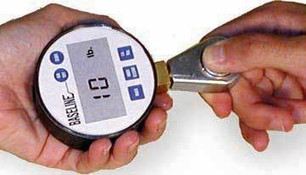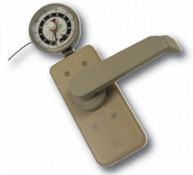Muscle strength testing is done for a range of purposes, including by physical therapists, occupational therapists, health screeners, and others. ProHealthcareProducts.com carries muscle strength testing devices that measure strength and functionality of the hands, arms, legs, and other functional systems of a person's body. Our innovative line of muscle testing equipment is used in hospitals, clinics, in research studies, and by individuals all over the world.
5% off Your Entire Purchase of $300 or More - Use Code TAKE5 During Checkout 

Categories
- Activities of Daily Living
- Ambulation Training Equipment
- Aquatic Therapy
- Balance Training Equipment
- Bathroom Assists
- Bimini Oxygen Perfusion System
- Beds, Mattresses & Accessories
- Cardiorespiratory Exercise Equipment
- Chiropractic Equipment
- Diabetic Care
- Exercise Equipment
- Fitness Agility
- Flexibility & Stretching Equipment
- Flexibility and ROM Testing Devices
- Gait Assists
- Hand Therapy
- Home Care
- Hot and Cold Therapy
- Human Anatomical Charts
-
Human Anatomy Models
- Human Arm Models
- Human Bones Models
- Human Brain Models
- Human Ear Models
- Human Eye Models
- Human Foot Models
- Human Full Body Skeleton Models
- Human Hand Models
- Human Heart Models
- Human Joints Models
- Human Larynx Models
- Human Leg Models
- Human Muscle Models
- Human Pelvis Models
- Human Skull Models
- Human Spine Models
- JTech Medical Products
- Massage
- Medical Clinic Supplies
- Medical Equipment & Supplies
-
Medical Diagnostics
- Aesthesiometers
- Biofeedback
- Percussion/ Reflex Hammers
- Physical Therapy Student Kit
- Anthropometric Tools
- Body Fat Measurement
- Cognitive Testing
- Electronic BP and Pulse Monitors
- Evaluation Sets
- Fingertip Pulse Oximeters
- Medical Thermometers
- Monofilament Tests
- Ophthalmoscopes & Otoscopes
- Sensory Evaluation
- Sphygmomanometers /Blood Pressure Gauges
- Spirometers
- Stethoscope
- Time & Distance
- Weight Scales
- Medical Scooters
- Medical Simulators
- Muscle Strength Testing Devices
- Occupational Therapy Equipment
- Pediatric Therapy
- Phlebotomy Equipment
- Physical Therapy Products
- PPE
- Resistance Training Devices
- Resistance Training Exercise Equipment
- Resistance Training Weights
- Respiratory/Oxygen Aids
- Skillbuilders Therapy Products
- Splints, Braces, Wraps, Supports & Scissors
- Sports Medicine Equipment
-
Therapeutic Modalities
- Acupuncture Needles
- AED
- Combo Ultrasound and E-Stim Therapy
- Compression Therapy
- Continuous Passive Motion (CPM) Devices
- Dry Needling
- Electrotherapy Accessories
- Electrotherapy Devices
- IASTM
- Iontophoresis
- Light and Laser Therapy Machines
- Neuromuscular Electrical Stimulation (NMES / EMS)
- Shockwave Therapy
- Shortwave Diathermy
- TENS Units
- Ultrasound Therapy Machines
- Treatment Furniture
- Transportation Equipment - Emergency
- Treatment Tables
- Wheelchairs
- Whirlpool Therapy Tubs
- Work Hardening Products
- Parts and Accessories
Quick Links
- Starting a Clinic
- Contact us
- About Us
- Resources
- Blog
- Request a Quote









